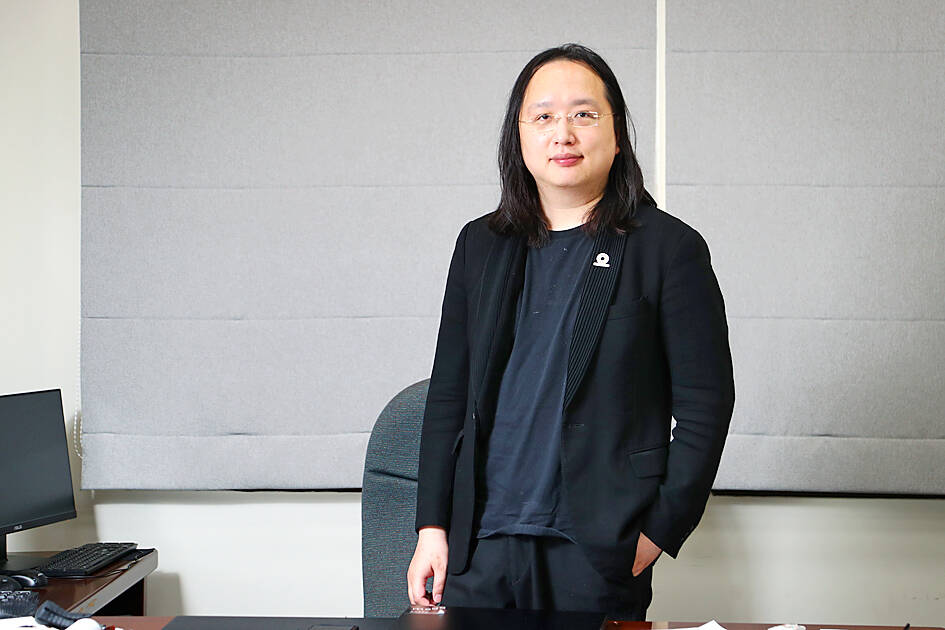Taiwan is looking at Ukraine’s ways of communicating its message to the outside world at a time of conflict, by making use of tools such as satellites and deploying humor, Minister of Digital Development Audrey Tang (唐鳳) said yesterday.
Chinese blockade drills around Taiwan last month, following a visit to Taipei by US House of Representatives Speaker Nancy Pelosi, have heightened concerns in the nation about the prospect of an attack by its larger neighbor.
“We look at the experience of Russia’s invasion of Ukraine in February. We found that the whole world can know what is happening there in real time,” Tang said.

Photo: CNA
Ukraine had effectively conveyed its message to the world, Tang said, adding that keeping up high-quality communication in real time was critical to its effort.
“It’s not only for our own people, but also for the people who care about us all over the world, so that we can enlist the assistance of international friends,” Tang said.
Among Tang’s plans to preserve communications if China attacks are a NT$550 million (US$17.7 million) satellite trial program to ensure Internet services across Taiwan.
The goal was to maintain social stability and keep Taiwan’s command systems running by “instantly” switching to alternative forms of communication, such as satellites in middle and lower orbit, she said.
Several Taiwanese companies are in talks with international satellite service providers, seeking partnerships after such service is legalized in Taiwan, she added, but gave no details.
Ukraine has been using SpaceX CEO Elon Musk’s Starlink satellite broadband service.
Tang helped craft Taiwan’s public messaging for the COVID-19 pandemic, using memes and humor to fight disinformation, much of which the government accused China of spreading, although Beijing denied it.
“We say very publicly that our playbook is ‘humor over rumor,’” she said.
“As we have seen with the Ukrainian example, there are also people who use ideas of even comedy, but certainly Internet memes, to spread a message that rallies the people,” Tang said.
A prolific Twitter user with more than 250,000 followers, Tang said she was not bothered by online attacks, which can include accusations that she is a “separatist.”
Chinese state media make heavy use of Twitter and other Western social media platforms, even though they are banned in China.
Asked about China using social media in its messaging campaign against Taiwan in case of a war, Tang said that was already happening.
“From my point of view it’s my daily life,” she said. “Already, the kind of propaganda as you call it, the kind of narratives going on on Twitter, that’s already what we face daily.”

Chinese Nationalist Party (KMT) Chairman Eric Chu (朱立倫), spokeswoman Yang Chih-yu (楊智伃) and Legislator Hsieh Lung-chieh (謝龍介) would be summoned by police for questioning for leading an illegal assembly on Thursday evening last week, Minister of the Interior Liu Shyh-fang (劉世芳) said today. The three KMT officials led an assembly outside the Taipei City Prosecutors’ Office, a restricted area where public assembly is not allowed, protesting the questioning of several KMT staff and searches of KMT headquarters and offices in a recall petition forgery case. Chu, Yang and Hsieh are all suspected of contravening the Assembly and Parade Act (集會遊行法) by holding

PRAISE: Japanese visitor Takashi Kubota said the Taiwanese temple architecture images showcased in the AI Art Gallery were the most impressive displays he saw Taiwan does not have an official pavilion at the World Expo in Osaka, Japan, because of its diplomatic predicament, but the government-backed Tech World pavilion is drawing interest with its unique recreations of works by Taiwanese artists. The pavilion features an artificial intelligence (AI)-based art gallery showcasing works of famous Taiwanese artists from the Japanese colonial period using innovative technologies. Among its main simulated displays are Eastern gouache paintings by Chen Chin (陳進), Lin Yu-shan (林玉山) and Kuo Hsueh-hu (郭雪湖), who were the three young Taiwanese painters selected for the East Asian Painting exhibition in 1927. Gouache is a water-based

Taiwan would welcome the return of Honduras as a diplomatic ally if its next president decides to make such a move, Minister of Foreign Affairs Lin Chia-lung (林佳龍) said yesterday. “Of course, we would welcome Honduras if they want to restore diplomatic ties with Taiwan after their elections,” Lin said at a meeting of the legislature’s Foreign Affairs and National Defense Committee, when asked to comment on statements made by two of the three Honduran presidential candidates during the presidential campaign in the Central American country. Taiwan is paying close attention to the region as a whole in the wake of a

OFF-TARGET: More than 30,000 participants were expected to take part in the Games next month, but only 6,550 foreign and 19,400 Taiwanese athletes have registered Taipei city councilors yesterday blasted the organizers of next month’s World Masters Games over sudden timetable and venue changes, which they said have caused thousands of participants to back out of the international sporting event, among other organizational issues. They also cited visa delays and political interference by China as reasons many foreign athletes are requesting refunds for the event, to be held from May 17 to 30. Jointly organized by the Taipei and New Taipei City governments, the games have been rocked by numerous controversies since preparations began in 2020. Taipei City Councilor Lin Yen-feng (林延鳳) said yesterday that new measures by